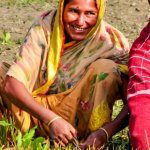By Elizabeth Bryan
Agricultural development policies and interventions that ignore gender dynamics miss opportunities to maximize benefits, including increasing resilience to climate change and variability. As more policy-makers and development practitioners acknowledge the importance of addressing gender in their work, they can draw on a growing body of research that highlights key entry points for more effectively integrating gender.
Read More...
The challenge of our lifetime: How to ensure nutrition for everyone under climate change
By Claire Davis and Jessica Fanzo
The connections between climate change, the global food system, and nutrition are woefully under-acknowledged. Yet the agriculture-food system is particularly vulnerable to climate change. For many regions, especially in the global South, it will be more and more difficult to produce enough nutritious, safe food for everyone in the future. This relationship is complex: climate change threatens our ability to feed a growing planet, but the food system also contributes significantly to greenhouse gas emissions (GHGs).
A new IFPRI discussion paper, “Climate Change and Variability: What are the Risks for Nutrition, Diets, and Food Systems?”, examines these connections in order to provide an overview of the existing research landscape. The paper uses a food systems approach as it analyzes the bidirectional relationship between food and climate along every step of the food value chain, from a farmer’s seed supply to a consumer having a meal.
Read More...
A new path to policy: Colombia’s participatory climate leadership
By Alex De Pinto
President Donald Trump’s announcement that the United States will withdraw from the 2015 Paris agreement on climate change, has cast the accord’s ultimate effectiveness into doubt. Nevertheless, the deal has pushed countries to devise innovative methods for limiting their own carbon emissions. An assessment of IFPRI’s contribution to shaping Colombia’s path to meet its Paris targets provides useful lessons on incorporating research into policy-making.
Read More...
How to ensure nutrition for everyone under climate change and variability
By Jessica Fanzo, Rebecca McLaren, Claire Davis, and Jowel Choufani
The intersection of climate change, food security, and nutrition is critical given that the growing adverse impacts of climate change threaten food security and nutrition outcomes, especially for the most vulnerable in the global South. Climate is a potential driver of nutritional status, but dietary choices can affect both nutrition and climate. A better understanding of the pathways linking climate change and nutrition is key to developing effective interventions to ensure that the world’s population has access to sufficient, safe and nutritious food. Undernutrition can be exacerbated by the effects of climate change at all stages of the food value chain. In addition, disease is affected by climate and can, in turn, increase the demand
for nutrients, while reducing nutrient absorption.
Project: Gender, Climate Change, and Nutrition Integration Initiative (GCAN)
Achieving the goals of Feed-the-Future and the Global Food Security Strategy requires careful consideration of the impact of relevant climate science on agricultural production, while at the same time considering other cross-cutting issues that influence agricultural growth, poverty alleviation and resilience, especially gender and nutrition.
To address these challenges the Gender, Climate Change and Nutrition Integration Initiative (GCAN) initiative works with USAID headquarters, field missions and partners to enhance understanding between climate, gender and nutrition toward enhanced resilience, women’s empowerment and nutrition outcomes.



